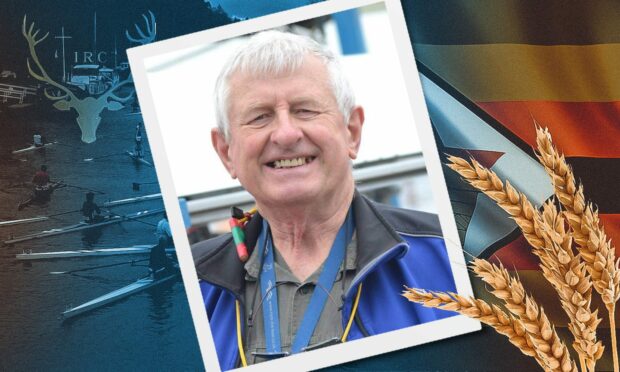Inverness Rowing Club honoured member and legendary coach Ian Hunter at his funeral.
Two former junior rowers held a sweep blade each for Ian at Inverness crematorium and blades were on show at the reception at Loch Ness Hotel.
Ian, who was 77, had been a successful farmer in Zimbabwe and the country’s national rowing coach before moving to Dingwall in 2002.
In Scotland he continued rowing and coaching while working as an organic farm inspector.
Medical background
He was born in Londonderry in May, 1944, the eldest of four children. Both his parents were vets so he grew up in a medical family.
Ian boarded at Coleraine Academical Institution where he began rowing aged 14.
He began veterinary medicine studies at Trinity College, Dublin, in 1966 and captained its boat club for four periods.
Ian raced at Henley several times and represented Ireland at the Home International Regatta.
Africa
After three years at Trinity he ended his studies to travel to South Africa to work on a large cattle ranch in the Orange Free State.
There he met and married Jill Hathorn of South Africa and moved to Zimbabwe to farm cattle, crops, crocodiles and ostriches.
He became Zimbabwe’s cattleman of the year in 1985 and won numerous awards for crop production.
Apart from a break in the 1970s during the Zimbabwe civil war, Ian rowed and coached all his life in South Africa, Zimbabwe, and later the UK.
Winner
In 1989 he was part of a crew that won A category in the British Masters Regatta and throughout the 1990s he was Zimbabwe national coach and coach to a number of schools.
Ian later remarried, to Susanne, in 1995 and both received national rowing colours for Zimbabwe.
Scotland
When the economy of Zimbabwe imploded, the family relocated to the Highlands where Ian farmed and worked as an organic farm inspector.
He soon became involved with Inverness Rowing Club and often coached university crews who came to Inverness for training camps.
His reputation led to an invitation to coach Scottish women’s crews for Home International Regattas, which he did for a number of years.
Despite failing health following a series of strokes from 2016, Ian continued to coach from the towpath on foot with a walking stick, and later from his parked car.
Legacy
His wife Susanne said: “Ian loved rowing and loved nothing better than the chance to teach and train young rowers.
“He leaves a legacy of many hundreds of rowing friends all over the world who were touched by his character and passion for the sport.”
Ian is survived by Susanne, sons Monty, Howard and Shaun, and daughters Oonagh, Vicky and Meghan, plus 11 grandchildren.

Conversation